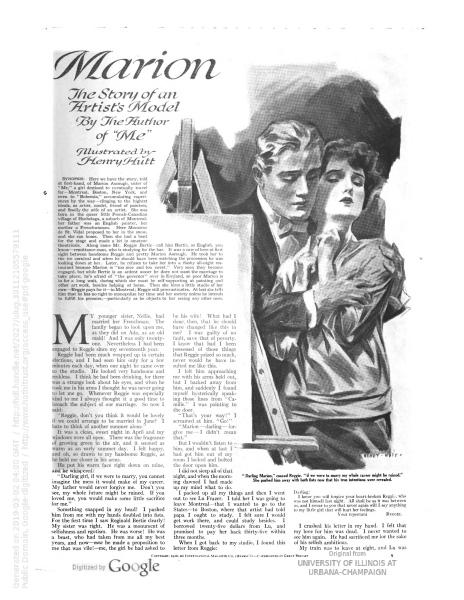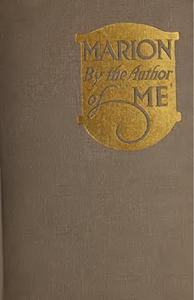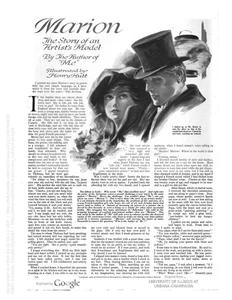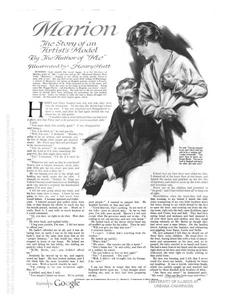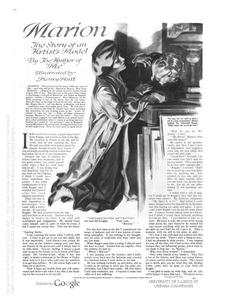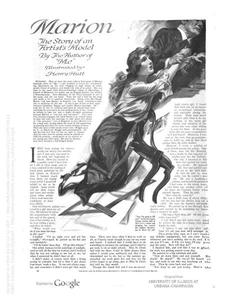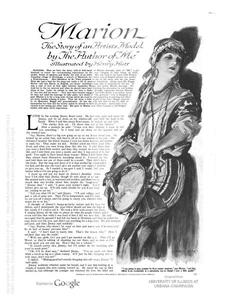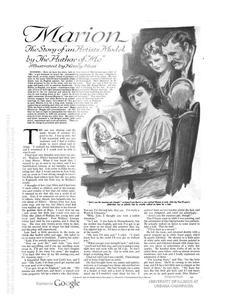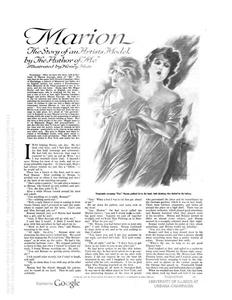My younger sister, Nellie, had married her Frenchman. The family began to look
upon me, as they did on Ada, as an old maid! And I was only twenty-one.
Nevertheless I had been engaged to Reggie since my seventeenth year.
Reggie had been much wrapped up in certain elections, and I had seen him only for
a few minutes each day, when one night he came over to the studio. He looked very
handsome and reckless. I think he had been drinking, for there was a strange look
about his eyes, and when he took me in his arms I thought he was never going to
let me go. Whenever Reggie was especially kind to me I always thought it a good
time to broach the subject of our marriage. So now I said:
“Reggie, don’t you think it would be lovely if we could arrange to be married in
June? I hate to think of another summer alone.”
It was a clean, sweet night in April and my windows were all open. There was the
fragrance of growing green in the air, and it seemed as warm as an early summer
day. I felt happy, and oh, so drawn to my handsome Reggie, as he held me closer in
his arms.
He put his warm face down on mine, and he whispered: “Darling girl, if we were
to marry, you cannot imagine the mess it would make of my career. My father
would never forgive me. Don’t you see, my whole future might be ruined. If you
loved me, you would make some little sacrifice for me.”
Something snapped in my head! I pushed him from me with my hands doubled into
fists. For the first time I saw Reginald Bertie clearly! My sister was right. He
was a monument of selfishness and egotism. He was worse! He was a beast, who had
taken from me all my best years, and now—now he made a proposition to
me that was vile!—me, the girl he had asked to be his wife! What had I done, then,
that he should have changed like this to me? I was guilty of no fault, save that
of poverty. I know that I had been possessed of those things that Reggie prized so
much, never would he have insulted me like this.
I felt him approaching me with his arms held out, but I backed away from him, and
suddenly I found myself hysterically speaking those lines from “Camille.” I
was pointing to the door.
“That’s your way!” I screamed at him. “Go!”
“Marion—darling—forgive me—I didn’t mean that.”
But I wouldn’t listen to him, and when at last I had got him out of my room I
locked and bolted the door upon him.
I did not sleep all of that night, and when the morning dawned I had made up my
mind what to do. I packed up all my things and then I went out to see Lu Frazer. I
told her I was going to leave Montreal—that I wanted to go to see the States—to
Boston, where the artist had told papa I ought to study. I felt sure that I would
get work there, and could study besides. I borrowed twenty-five dollars from Lu,
and promised to pay her back thirty-five within three months.
When I got back to my studio, I found this letter from Reggie:
Darling:
I know you will forgive your heart-broken Reggie, who was not himself
last night. All shall be as it was between us, and I swear to you that
never again will I say anything to my little girl that will hurt her
feelings.
Your repentant
REGGIE.
I crushed his letter in my hand. I felt that my love for him was dead. I never
wanted to see him again. He had sacrificed me for the sake of his selfish
ambitions.
My train was to leave at eight, and Lu was
10going to be there to see me
off. I sat down and wrote the following letter to Reggie before leaving the
house:
Dear Reggie:
I am leaving for Boston to-night. I have loved you very dearly, and I
feel bad at leaving you without saying good-by, but I will not live any
longer in that studio that you pay for, and I could not stand home any
more.
I can earn my living better in Boston, and when you are ready I will come
back to you, but I cannot trust myself to say good-by.
Your loving
MARION.
Then I went down to Hochelaga, and said good-by to them all at home. Papa hunted
up the address of Mr. Sands, the artist for whom I had done that work when a
little girl of thirteen. Papa felt sure he would help me get something. Mama and
papa seemed to have a vague idea that I had some definite place I could go to,
and they did not ask any questions. We girls often felt older than our
parents—anyway, more worldly, and they had the greatest trust in our ability to
take care of ourselves.
Ada thought it a good thing for me to go. She said I would get better pay for my
workin Boston and that I must be sure to send something home each week, just as
Nora was doing.
I felt a lump in my throat when I left the old house. There was still a bit of
snow in the garden, though it was April, where I had played as a child. I put my
head out of the cab window to take a last look at the familiar places which, I
told myself with a sob, I might never see again.
Lu was at the station. She had my ticket, and the balance of the twenty-five
dollars in an envelope, which she slipped into my hand. The train was nearly due
to go. My foot was on the step when I heard Reggie’s voice, calling my name. He
came running down the platform.
“Marion! You shall not go. You’re carrying this too far, darling.”
“Yes, yes, I’m going,” I said to Reggie. “You’re not going to stop me any
longer.”
“But Marion, I didn’t mean what I said.”
I stared up at him directly. “Reggie, if I stay, will we be married—right
away?”
“Why—Marion, look here, old girl, you can wait a little longer, can’t
you?”
I laughed up at him wildly, “No!” I cried harshly, “I can’t. And I hope God
will never let me see your face again.”
I ran up the steps of the train and darted inside. I did not look out.
Never shall I forget that journey in the train. I had not thought to get a
sleeper, so I sad up all night long. I had the whole seat to myself. The conductor
turned the next see over toward me, and by putting up my feet I was fairly
comfortable.
I shut my eyes, and tried to go to sleep, but the thoughts that came thronging
through my head were too many. I wept for my lost sweetheart, and yet I vowed
never to go back to him. His future should not be spoiled by me.
Oh, as I thought of how many times Reggie
11had said that, a feeling of
helpless rage against him took possession of me. I saw him in all his ambitious,
selfish, narrow snobbery and pride. Even his love for me was a part of his
peculiar fastidiousness. He wanted me for himself, because I was prettier than
most girls, just as he wanted all luxurious things, but he never stopped to think
of my comfort or happiness.
Somehow as the train slipped farther and farther and farther away from Montreal,
Reggie’s influence over me seemed to be vanishing, and presently, as I gazed out
into the night, he passed away from my mind altogether.
We were passing through dark meadows, and they looked gloomy and mysterious under
that starlit sky. I thought of how papa had taught us all so much about the stars,
and how he said one of our ancestors had been a great astronomer. Ada knew all of
the planets and suns by name, and could pick them out, but to me they were always
little points of mystery. I remembered as a little girl I used to look up at them
and say to one particular star:
’Star bright, star light
First star I see to-night
Wish I may—wish I might
Get the wish I wish to-night.’
Then I would say quickly: “Give me a doll’s carriage.”
Ada had told me if I did that for seven nights, the fairies would give me whatever
I asked for, and each night I asked for that doll’s carriage. I watched to see it
come, and I would say to Ada:
“What’s the matter with those old fairies? I thought you said they’d give me my
wish?”
Ada would answer: “Oh, fairies are invisible, and no dout the carriage is right
near by, but you can’t see it.”
“But what’s the use,” I would say, “of a carriage I can’t see?”
“Try it again,” would say Ada. “Perhaps they’ll relent. You probably
offended them, or didn’t do it just right.”
For seven nights more I would faithfully repeat the formula. Then, at Ada’s
suggestion, I would hunt in the tall grass at the end of the garden.
“Perhaps,” would say Ada, “there is a fairy sitting on the edge of a blade
of grass, and she had the carriage.”
Then I would lie in the grass, and wait for the carriage to become visible. I
never got that doll’s carriage. The fairies never relented.
I dozed for a little while, and was awakened by the faint crowing of cocks, and I
thought sleepily of a little pet chicken I used to dress in baby’s clothes, and I
dreamed of a lovely wax doll that Mrs. McAlpin had given me.
It was queer how, as I lay there, all these little details of my childhood came up
to my mind. I saw that wax doll as plainly as if I had it in my arms again. My
brother, Charles, had taken a slate pencil and had made two cruel marks on its
sweet face, and had left the house laughing at my rage and grief. All day long I
had nursed my doll, rocking it back and forth in my arms and sobbing:
“Oh, my doll! Oh, my doll!”
Ada had said: “Don’t be silly. Dolls don’t feel. But she is disfigured for life,
like smallpox.”
I threw her down. I rushed up to Charles’s room bent upon avenging her. Hanging on
the wall was a lacrosse stick, the most treasured possession of my brother. I
seized a pair of scissors, and I cut the catgut of that lacrosse . As it snapped,
I felt a pain and terror in my heart. I tried to mend it, but it was ruined. Ada’s
shocked face showed at the door.
“I’m glad!” I cried to her defiantly.
“Poor Charles,” said Ada, “saved up all of his little money to get that
stick, and he did all those chores, and he’s the captain of the Shamrock
Lacrosse team. You are a mean, wicked girl, Marion.”
“I tell you, I’m glad!” I declared fiercely.
But when Charles came home, and saw it, he held that stick to his face and burst
out crying, and Charles never, never cried. I felt like a murderess, and I cried
out:
“Oh, I’m sorry, Charles. Here’s all my pennies. You buy a new one.”
“You devil!” he stormed and lifted up his hand to strike me. I fled behind
papa’s chair, but I wished, oh! how I wished, that Charles would forgive me.
It all came back to me, like a dream, in the train, and I found myself crying for
Charles even as I had cried then.
And again I began to think of Reggie—Reggie who had hurt me so terribly; Reggie,
whom I had thought I loved—loved above everybody else in the world. What was it he
had said to me? That I should be his wife without a ceremony! I sat up in the
seat. I felt frozen stiff. I was looking at the naked truth in the plain light of
day. The glamour was gone from my romance. I was awake to the bare, ugly
facts.
The train was moving slowly, and someone said we were nearing Boston. I shook off
all memories of Montreal, and an expectant feeling of excitement came over me.
What did this big United States mean to me? I felt suddenly light and happy and
free! Free! That was a beautiful word, that everyone used in this “Land of
Liberty.”
I went into the dressing-room and washed my face and hands and did my hair afresh.
A girl was before the mirror, dabbing powder and rouge over her face, and she took
up all the room, so I could not get a glimpse of myself in the mirror.
“You look as fresh as a daisy,” she said, turning around and looking at me;
“and I guess you’ve had a good night’s rest. I hardly sleep in those stuffy
sleepers, and my fellow’s to meet me, so I don’t want to look a fright.”
I asked if we were near to Boston, and she said we were there now. The train had
come to a standstill. When I left the train with my bag in my hand I felt excited
and a little bit afraid. I realized that I had no especial destination, and the
part of the city where the station was did not look as if it was the place to find
a room. There were many cars passing, and I finally got on one, a Columbus
Avenue.
As we rode along, I looked out of the window, and watched the houses for a “Room
to Let” sign, and presently we came to some tall, stone houses, all very
much alike, and ugly and severe-looking after our pretty Montreal houses with
their bits of lawn and sometimes even little gardens in front. There were “Room
to Let” signs on nearly all the houses on this block. So I got out, and went
up the high steps of the one I thought looked the cleanest.
I rang the bell, and a black woman opened the door. I said:
“Is your mistress in?” and she said: “How?”
We never say “How?” like that in Canada. If you aren’t polite enough to say:
“I beg your pardon?” then we say: “What?” So I thought she meant how
many rooms did I want, and I said: “Just one, thank you.”
She walked down the hall, and I heard her say to someone behind a curtain there:
“Say, Miss Darling, there’s a girl at the door. I think she’s a furriner. She
sure talks and looks like no folks I knows.”
There was a slight laugh, and then a faded little woman in a faded kimono came
hurrying down the hall. I call her
“faded looking,” because that describes
her very well. Her face, once pretty, no doubt, made me think of a
57half-washed-out painting. Her hair was almost colorless, though I suppose it had
once been dull brown. Now wisps of grayish hair stood out about her face as if ash
had blown against it. She had dim, near-sighted eyes, and there was something
pathetically worn and tired-looking about her.
“Well? What is it you want?” she inquired.
I told her I wanted a little room, and said: “I’ve just arrived from
Montreal.”
“Dear me!” she exclaimed, “you must be tired”! She seemed
to think Montreal was as far away as Siberia.
She showed me up three flights of stairs to a tiny room, in which was a
folding-bed. As I had never seen a folding-bed before, she opened it up and showed
me how it worked. When it was down there was scarcely an inch of room left, and I
had to put the one chair out into the hall.
She explained that it would be much better for me to have a folding-bed, because
when it was up I could use the room as a sitting-room and see my company there. I
told her I did not expect any company, as I was a perfect stranger in Boston. She
laughed—that queer little birdlike laugh I had heard behind the curtain, and
said:
“I’ll take a bet, you’ll soon have all the company this room will hold.”
There was something kindly about her tired face and when I asked her if I had to
pay in advance—the room was three dollars a week she hesitated, and then said:
“Well, it’s the custom, but you can suit yourself. There’s no hurry.”
I sometimes think that nearly everyone in the world has a story, and, if we only
knew it, those nearest to us might surprise us with a history or romance of which
we never dreamed. Take my little faded landlady. She was the last person in the
world one would have imagined the heroine of a real romance, but perhaps her
romance was too pitiful and tiny to be worth the telling. Nevertheless when I
heard it from another lodger in the house—I felt drawn to poor Miss Darling. To
the world she might seem a withered old maid. I knew she was capable of a great
and unselfish passion.
She had come from Vermont to Boston, and had worked as a cashier in a downtown
restaurant. She had slowly saved her money until she had a sufficient sum with
which to buy this rooming-house, which I sometimes thought was as sad and faded as
she.
While she was working so hard, she had fallen in love with a young medical
student. He had even less money than Miss Darling. When she opened her
rooming-house, she took him in, and for three years she gave him rent free and
supported him entirely, even buying his medical books, paying his tuition, his
clothes and giving him pocket-money. He had promised to marry her as soon as he
passed, but within a few days after he became a doctor he married a wealthy girl
who had lived in Brookline and on whom he had been calling all the time he had
been living with Miss Darling.
The lodger who told me about her said she never said a word to anyone about it,
but just
58began to fade away. She lost thirty pounds in a single month,
but she was the
“pluckiest little sport ever,” said the lodger.
It seemed to me our stories were not unlike, and I wondered to myself whether
Reggie was capable of being as base as was Miss Darling’s lover.
While I was taking my things out of my suitcase Miss Darling watched me with a
rather curious expression, and suddenly she said:
“I don’t know what you intend to do, but take my advice. Don’t be too easy. If I
were as young and pretty as you, I tell you, I would make every son-of-a-gun
pay me well.”
I said: “I’ll be contented if I can just get work soon.”
She looked at me with a queer, bitter little smile, and then she said:
“It doesn’t pay to work. I’ve worked all my life.”
Then she laughed bitterly, and went out suddenly closing the door behind her.
As soon as I had washed and changed from my heavy Canadian coat to a little
blue-cloth suit I had made myself, I started out at once to look up the artist,
Mr. Sands, whose address papa had given me.
I lost my way several times. I always got lost in Boston. The streets were like a
maze, winding around and running off in every direction. I finally found the
studio building on Boylston Street, and climbed up four flights of stairs. When I
got to the top, I came to a door with a neat little visiting card with Mr. Sands’s
name upon it. I remembered that Count von Hatzfeldt had his card on the door like
this, and for the first time I had an instinctive feeling that my own large
Japanned sign: “Miss Ascough, Artist, etc.” was funny and provincial. Even
papa had never put up such a sign, and when he first saw mine he had laughed and
then had run his hand absently through his hair and said he “supposed it was all
right” for the kind of work I expected to do. Dear papa! He wouldn’t have
hurt my feelings for worlds. With what pride had I not shown him my sign and
“studio”!
I knocked on Mr. Sands’s door, and presently he himself opened it. At first he did
not know me, but when I stammered: “I’m—Miss Ascough. D-don’t you remember me? I
did some work for you in Montreal eight years ago, and you told me to come to
Boston. Well—I’ve come!”
“Good heavens!” he ejaculated; “did I ever tell anybody to come to Boston?
Good heavens!” And he stood staring at me, as if he still were unable to
place me. Then, after another pause, during which he stared at me curiously, he
said: “Come in, come in!”
While he was examining me, with his palette stuck on his thumb, and a puzzled look
on his face, as if he didn’t quite know what to say or do with me, I looked about
me.
It was a very luxurious studio, full of beautiful draperies and tapestries. I was
surprised, as the bare stairs I had climbed and the outside of the building were
most unbeautiful. Sitting on a raised platform was a very lovely girl, dressed in
a Greek costume, but the face on the canvas of the easel was not a bit like
hers.
Mr. Sands, as though he had all of a sudden really placed me in his mind, held out
his hand and shook mine heartily, exclaiming:
“Oh, yes, yes, now I remember. Ascough’s little girl. Well, well, and how is
dear old Montreal? And your father, and his friend—what was his name?
Mmmmum—let me see—that German artist—you remember him? He was crazy—a
madman!”
Lorenz was the artist he meant. He was a great friend of my father’s. Papa thought
him a genius, but mama did not like him at all, because she said he used such
blasphemous language and had a bad influence on papa. I remember I used to love to
hear him shout and declaim and denounce all the shams in art and the Church. He
was a man of immense stature, with a huge head like Walt Whitman’s. He used to
come to the Château to see the Count, with whom he had long arguments and
quarrels. He was German and the Count a Dane. he would shout excitedly at the
Count and wave his arms, and the Count would shriek and double up with laughter
sometimes, and Mr. Lorenz would shout: “Bravo! Bravo!”
They talked in German, and I couldn’t understand them, but I think they were
making fun of English and American art. And as for the Canadian! The mere mention
of Canadian art was enough to make the old Count and Lorenze explode.
Poor old Lorenz! He never made any money, and was awfully shabby. One day papa
sent him to Reggie’s office to try to sell a painting to the senior partner, who
professed to be a connoisseur. Mr. Jones, the partner, came out from his private
office in a hurry, and seeing Lorenz waiting, mistook him for a beggar, he put his
hand in his pocket and gave Lorenz a dime. Then he passed out. Lorenz looked at
the dime and said:
“Vell, it will puy me two beers.”
I told Mr. Sands all about Lorenz and also about the Count I had worked for; about
papa, some of whose work the Duke of Argyll had taken back to England with him, as
representative of Canadian art (which it was not—papa had studied in France, and
was an Englishman, not a Canadian), and of my own “studio.” while I talked,
Mr. Sands went on painting. The model watched me with what I thought a very sad
expression. Her dark eyes were as gentle and mournful as the Madonna’s. She didn’t
look unlike our family, being dark and foreign-looking. She was French. Mr. Sands
was painting her arms and hands on the figure on the canvas. He explained that the
face belonged to the wife of Senator Chase. She was the leader of a very smart set
in Brookline. He said that the ladies who sat for their portraits usually got
tired by the time their faces were finished, and he used models for the figures,
and especially the hands.
“The average woman,” said Mr. Sands, “has extremely ugly hands. The hands
of Miss St. Denis, as you see, are beautiful—the most beautiful hands in
America.”
I was standing by him at the easel, watching him paint, and I asked him if it were
really a portrait, for the picture looked more like a Grecian dancing figure. Mr.
Sands smiled and said:
“That’s the secret of my success, child. I never paint portraits as portraits. I
dress my sitters in fancy costumes and paint them as some character. There is
Mrs. Olivet. Her husband is a wholesale grocer. I am going to paint her as
Carmen. This spirituelle figure, with the filmy veil about
her, is Mrs. Ash Browning, a dead-and-alive wishy-washy individual; but, as you
see, her ‘beauty’ lends itself peculiarly to the nymph she represents.”
I was so much interested in listening to him, and watching him work, that I had
forgotten what I had come to see him about, till presently he said:
“So you are going to join the classes at the Academy?”
That question recalled me, and I said hastily:
“I hope so, by-and-by. First, though, I shall have to get some work to
do.”
He stopped painting, and stared at me, with his palette in his hand, and as he had
looked at me when he opened the door.
I unwrapped the package I had brought along with me, and showed him the piano
scarf I had painted as a sample, a landscape I had copied from one of papa’s and
some miniatures I had painted on a celluloid. I said:
“People won’t be able to tell the difference from ivory when they are framed,
and I can do them very quickly, as I can trace them from a photograph
underneath, do you see?”
His eyes bulged, and he stared at me harder than ever. I also showed him some
charcoal sketches I had done from casts, and a little painting of our kitten
playing on the table. He picked this up and looked at it, and then set it down
muttering something I thought was “Not so bad.” After a moment he picked it
up again and then he stared at me a moment and said: “I think you have some
talent, and you have come to the right place to study.”
“And work, Mr. Sands,” I said. “I’ve come here to earn my living. Can you
give me some painting to do?”
He put down his palette and nodded to Miss St. Denis to rest. Then he took hold of
my hand and said: “Now, Miss Ascough, I am going to give you some good advice,
chiefly because you are from my old Montreal” (Mr. Sands was a Canadian),
“because of your father and our friend, good old man Lorenz. Finally because
I think it is my duty. Now, young lady, take my advice. If your parents can
afford to pay your expenses here, stay and go to the art schools. But, if you
expect to make a living by your painting in Boston, take the next train and go
home!”
“I can’t go home!” I cried. “Oh, I’m sure you must be mistaken. Lots of
women earn their livings as artists. Why shouldn’t I? I worked for Count von
Hatzfeldt, and he said I had more talent than the average woman who
paints.”
“How much did he pay you?” demanded Mr. Sands.
“Five dollars a week and sometimes extra,” I said. Mr. Sands laughed.
“You would starve on that here, even if you could make it, which I doubt. In
Montreal you had your home and friends. It’s a different matter here
altogether.”
I felt as I once did when, as a child, I climbed to the top of a cherry-tree, and
Charles had taken away the ladder, and I tried to climb down without it. I kept
repeating desperately:
“I won’t go back! I tell you, I won’t! No, no, nothing will induce me to go
back!”
I gathered up all my paintings. I felt distracted and friendless. Mr. Sands had
returned to his painting and seemed to have forgotten me. I saw the model watching
me, and she leaned over and said something in a whisper to Mr. Sands. He put his
palette down again and said: “Come, Miss St. Denis. This will do for to-day. We
all need a bit of refreshment. Miss Ascough looks tired.”
I was, and hungry too. I had eaten lunch, for I had lost so much time looking for
Mr. Sands’s studio.
He brought out a bottle wrapped in a napkin, and a big plate of cakes. He
said:
“I want you to taste my own special brand of champagne cocktail.”
He talked a great deal then about brands of wines and mixtures, while I munched on
the cakes, which I found difficulty in swallowing, because of the lump in my
throat. But I was determined not to break down before them, and I even drank some
of the cocktail he mixed for me. Presently I said:
“Well, I guess I’ll go,” and I gathered up my things. Mr. Sands stood up, and
put his hands on my shoulders. Miss St. Denis was standing at his elbow, and she
watched me all the time he was speaking.
“Now, Miss Ascough, I am going to make a suggestion to you. I see you are
determined not to go back. The only way I can think of your making a living is
by posing.”
I drew back from him.
“I am an artist,” I said, “and the daughter of an artist.”
He patted me on the back.
“That’s all right. I know how you feel. I’ve been a Canadian myself; but there’s
no use getting mad with me for merely trying ot help you. You will starve here
in Boston, and I’m simply pointing out to you a method of earning your living.
There’s no disgrace connected with such work if it is done in the proper
spirit. As far as that goes, many of the art students are earning extra money
to help pay their tuition that way. The models here get pretty good pay.
Thirty-five cents an hour for costume posing and fifty cents for the nude. We
here in Boston pay better than they do in New York, and we treat them better,
too. Of course, there are not so many of us here, and we haven’t as much work,
but a model can make a fair living, isn’t that so, Miss St. Denis?”
She nodded, slowly, her eyes still on me; but there was something warm and pitying
in their dark depths.
“Now,” went on Mr. Sands, “I don’t doubt that you will get plenty of work.
You are an exceedingly pretty girl. I don’t need to tell you that, for of
course you know it. Are you nearly eighteen yet?”
“I’m nearly twenty-two.”
“You don’t look it. The hands are all right—fine—and your feet,” he smiled as
I shrank under his gaze, “they seem very little. Small feet are not always
shapely, but I dare say yours are. Your hair—and your coloring—Yes, I think you
will do famously. It’s rather late in the season—but I dare say you’ll get
something. Now what do you say? Give over this notion of painting for awhile,
and perhaps I can get you some work right away.”
“I’ll never, never, never pose—nude,” I said.
“Hm! Well, well—of course, that’s what we need most. It’s easy to get costume
models—many of our women friends even pose at that. However, now, would you
consider it very infra dig, then to pose for me, say to-morrow, in
this Spanish scarf. You are just the type I need, and I believe I can help you
with some of the other artists.”
I thought of the few dollars I had left. I had only about twelve dollars in all.
Mr. Sands said he would pay me the regular rate, though I was not experienced.
After a moment’s thought I said:
“Yes, I’ll do it.”
“Now, that’s talking sensibly,” he said smiling,
“and Miss St. Denis here
will take 59you with her to other places to see about getting
work.”
She said: “Yes, certainement, I will do so. You can come wiz me now.”
I thanked Mr. Sands, and he patted me on the shoulder and told me not to worry. He
said he would give me some work regularly till the middle of May when he went away
for the summer. I would get thirty-five cents an hour, and pose two hours a day
for him. When we got to the street the lights were all lit, and the city looked
very big to me. Miss St. Denis invited me to have dinner with her. She knew a
place where they served a meal for twenty-five cents. She seemed to think that
quite cheap. I told her I couldn’t afford to pay that much every night and she
said:
“Well, you will do so by-and-by. Soon you will get more work.”
After dinner, she took me to a night school, where she posed, as she said she
wished me to see how it was done. Of course, I had already seen Lil Markey pose
for the Count, but she was just an amateur model then. It did seem worse to me,
moreover, to go out there before a whole class than before one man. Miss St. Denis
seemed surprised when I said that, and she declared it was quite the other
way.
That night I sat in my little narrow bedroom, and looked out of the window, and I
thought of all I had learned that day, and it seemed clear to me that Mr. Sands
was right. There was little opportunity for me to make a living as an artist in
Boston.
What was to become of me, then ? Should I return home? The thought of doing that
made me clinch my hands passionately together and cry to myself:
“No, no, never, never!”
I remembered something Mr. Davis had said to me when he was teaching me to act. He
said that I should forget my own personality and try to imagine myself the person
I was playing. Why should I not do this as a model? I was resolved to try it. It
could not be so bad, since Mr. Sands had recommended it. Yes, I would do it! I
would be a model! But I should not tell them at home.
With the resolve came first a sense of calmness, and then suddenly a rush of rage
against Reggie who had driven me to this. I had the small-town English girl’s
foolish contempt for a work I really had no reason for despising. As the daughter
of an artist, and, as I thought, an artist myself, it seemed to me I was signing
the death-warrant of my best ambitions, and, as I have said, with rage, that
Reggie was to blame for this. I looked out of that window and, lifting up my eyes
and hands to the skies, I called:
“Father in heaven, hear me, and if I ever go back to Reggie, may all kinds of
ills come upon me. Amen!”
Now, I thought, as I got into that folding-bed, “I don’t doare to go back, for
God will punish me if I do.”
My trunk arrived next morning, and the driver charged me fifty cents to bring it
from the station. I had always seen Reggie tip the drivers, so I offered him a
nickel. The driver was a big, good-natured looking fellow, and he looked at the
tip and then at the little room, and he said:
“I’ll not take the tip, kid, but I’ll be catching you around the corner some
evening, and take a kiss instead.”
He had such a merry twinkle in his eye and looked so kind, that somehow I didn’t
resent his familiarity. I even vengefully laughed ot myself, to think how Reggie
would have looked to hear that common man speak to me like that.
All next day I went with Miss St. Denis to the studios and schools, waiting for
her in some of then while she posed, and stopping only for a few minutes in others
while she introduced me. I got several engagements and Miss St. Denis made me jot
them down in a notebook she brought along. She said I must take everything offered
to me, but that I must be careful not to get my hours mixed. I should even work at
night, if necessary, for the season was almost over, and soon I would have
difficulty in getting engagements.
Miss Darling had told me about a boarding place opposite her house, where I could
get board for three dollars a week. I crossed over that evening, and entered one
of those basement dining-rooms that lined almost the whole avenue. I had a
newspaper with me, and while I waited for my dinner I went over the
advertisements.
I was interrupted by a stir and movement in the room. A girl had come in with a
little dog, and everybody was looking at the dog. She came over to my table and
took the seat directly in front of me. I stared at her. I could not believe my
eyes. There, sitting right at my table, was my little sister Nora! I thought she
was in Jamaica.
We both jumped to our feet and screamed our names, and then I began to cry, and
Nora said:
“Sh-h! They are all looking at us!”
The dining-room was full of medical students and Harvard students. I had noticed
them when I came in—one reason why I buried myself in the paper, because they all
looked at me, and one, a boy named Jimmy Odell (I got to know Jimmy well later),
tried to catch my eye, and when I did look at him once, he winked at me which made
me very angry, and I hadn’t looked up once again till Nora came in.
You may be sure those students didn’t take their eyes off us all through that
meal, and every one of them fed Nora’s dog. They had started to laugh and hurrah
when Nora and I first grabbed each other, but when I cried they all stopped and
pretended to fuss with the dog.
I don’t know what I ate that day. Nora said I ate my meal mixed with salt tears,
but she was too excited and we both talked together. Nora had changed. She seemed
more sophisticated than when I saw her last, and she had her hair done up. She
showed me this almost the first thing, and she said it made her look quite as old
as I. She thought that fine. She assumed an older-sister way with me which was
very funny, for I had always snubbed her at home as being a kid while I was a
young lady.
When we went to her room, which, strange to say, was in the same block as mine,
two of the students followed us, one of them that Odell. We didn’t pay any
attention to them, though Odell had the insolence to run up the steps when Nora
was turning the key in the lock, and ask if he couldn’t do it for her. We both
regarded him haughtily, which made him ashamed, I suppose, for he lifted his hat
and ran down the stairs again.
Nora was expecting money by telegraph from some doctor in Richmond, for whom she
was going to work. She had been doing the same sort of work as Ada, writing for a
newspaper, and she had written “tons of poetry and stories and other things,”
she said.
I wanted to talk over home things and the work we were to do, but Nora made me
listen to all her stories. She would pile up the two pillows on her bed for a
comfortable place for me, and then coax me to lie there while she read. She would
say:
“Now, Marion, let me make you comfortable, and you rest yourself—you look
awfully tired, and I’m sure you need a rest! while I read you this.”
Then she would read one story after the other, till I would get dead tired, but if
I closed my eyes she would get offended; so I’d hold them open, no matter how
sleepy I got. Sometimes I couldn’t help laughing at the funny parts in her
stories, which delighted her, and she would laugh more than I would, which made
her little dog yelp and jump about. Then, when I cried at sad parts, she would get
much excited, and say:
“Now I know it must be good. Some day huge audiences in big theaters all over
the world will be crying just as you are now.”
Then her dog would jump up and lick her face, and I would say:
“Don’t you think that’s enough for to-night?”
Poor little Nora! She had hardly any money, but it didn’t seem to bother her a
bit. Though I knew I would miss her, I advised her to take the steady position
offered in Richmond, instead of starving here, and a few days later I saw her off
for the South. She looked pathetic and awfullly childish (in spite of her hair
done up), and I felt more lonely than ever. I was crying when I got back to the
lodging-house, and when I opened the door Miss Darling was standing talking to
some man in the hall. She called to me just as I was going up the stairs:
“Miss Ascough, here’s a nice young gentleman who wants to meet you.”
I came back down the stairs, and there was that Harvard student, Odell. He had a
wide smile on his face, and his hand held out. There was something so friendly and
winning in that smile, and somehow the pressure of his big hand on mine felt so
warm and comforting, and I was so lonely, that when he asked me to go out with him
to dinner and after that to the theater I said at once: “Yes, I will.”
Thus began my acquaintance with a boy who devoted himself to me throughout his
stay in Boston.
